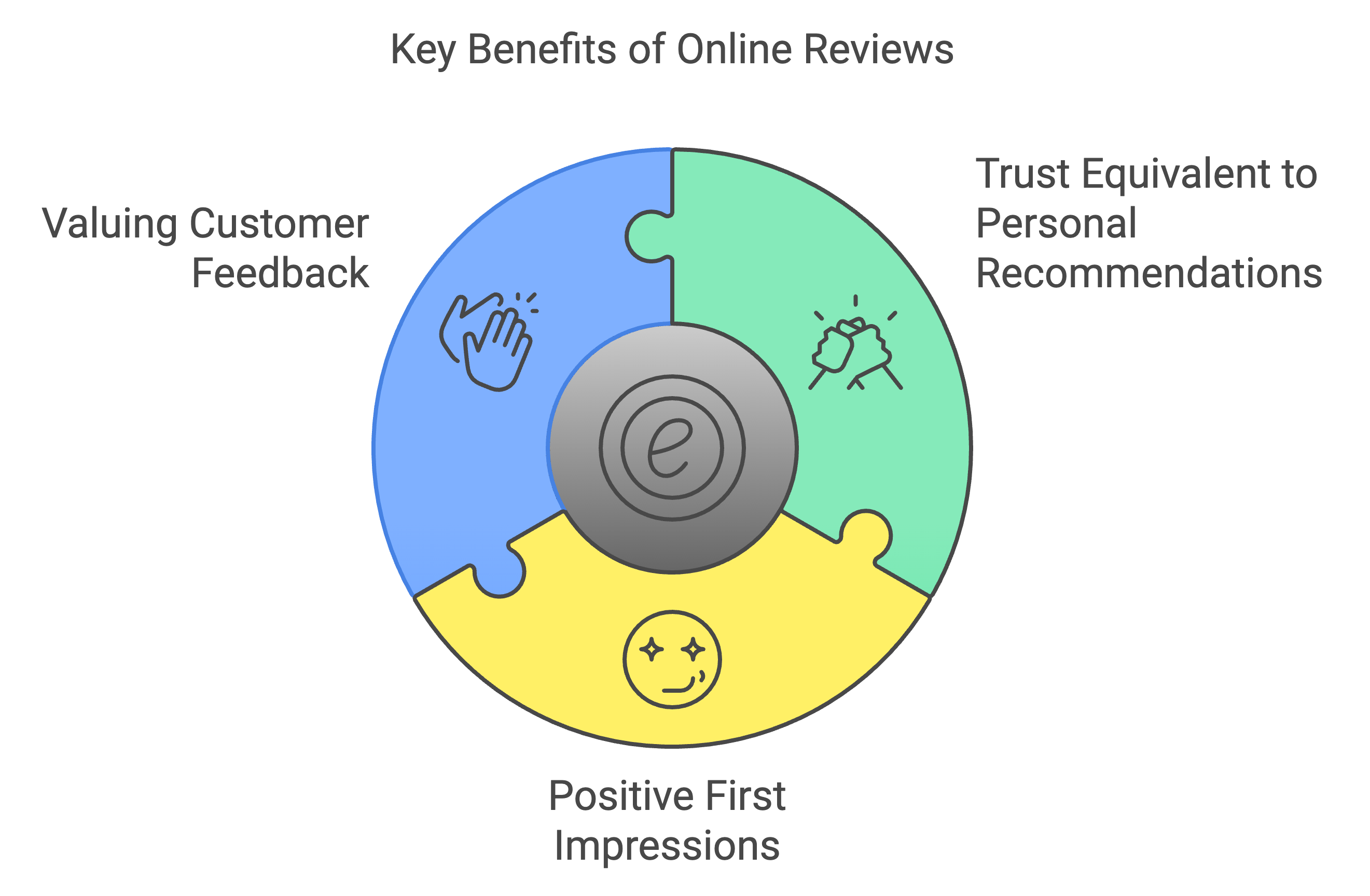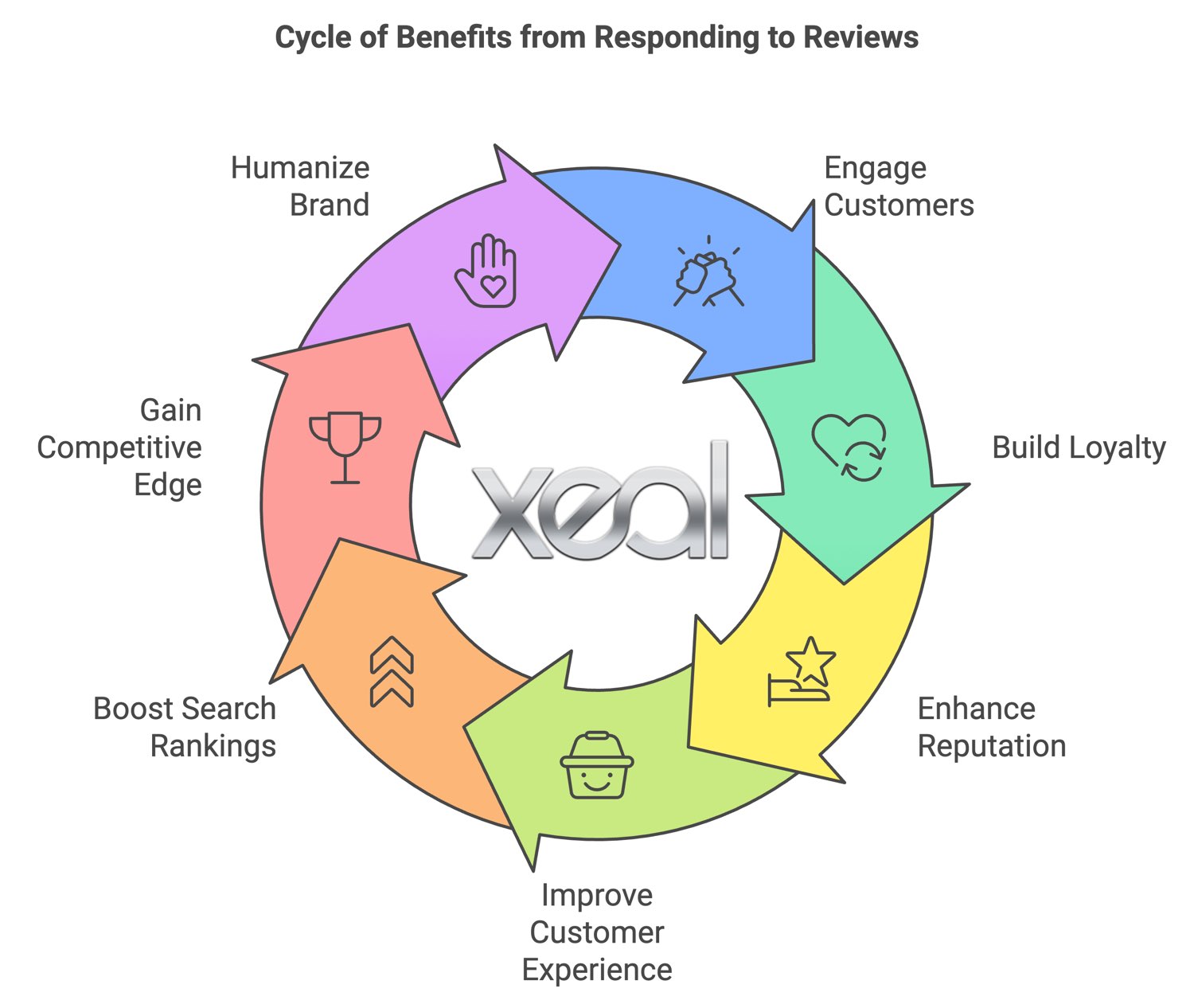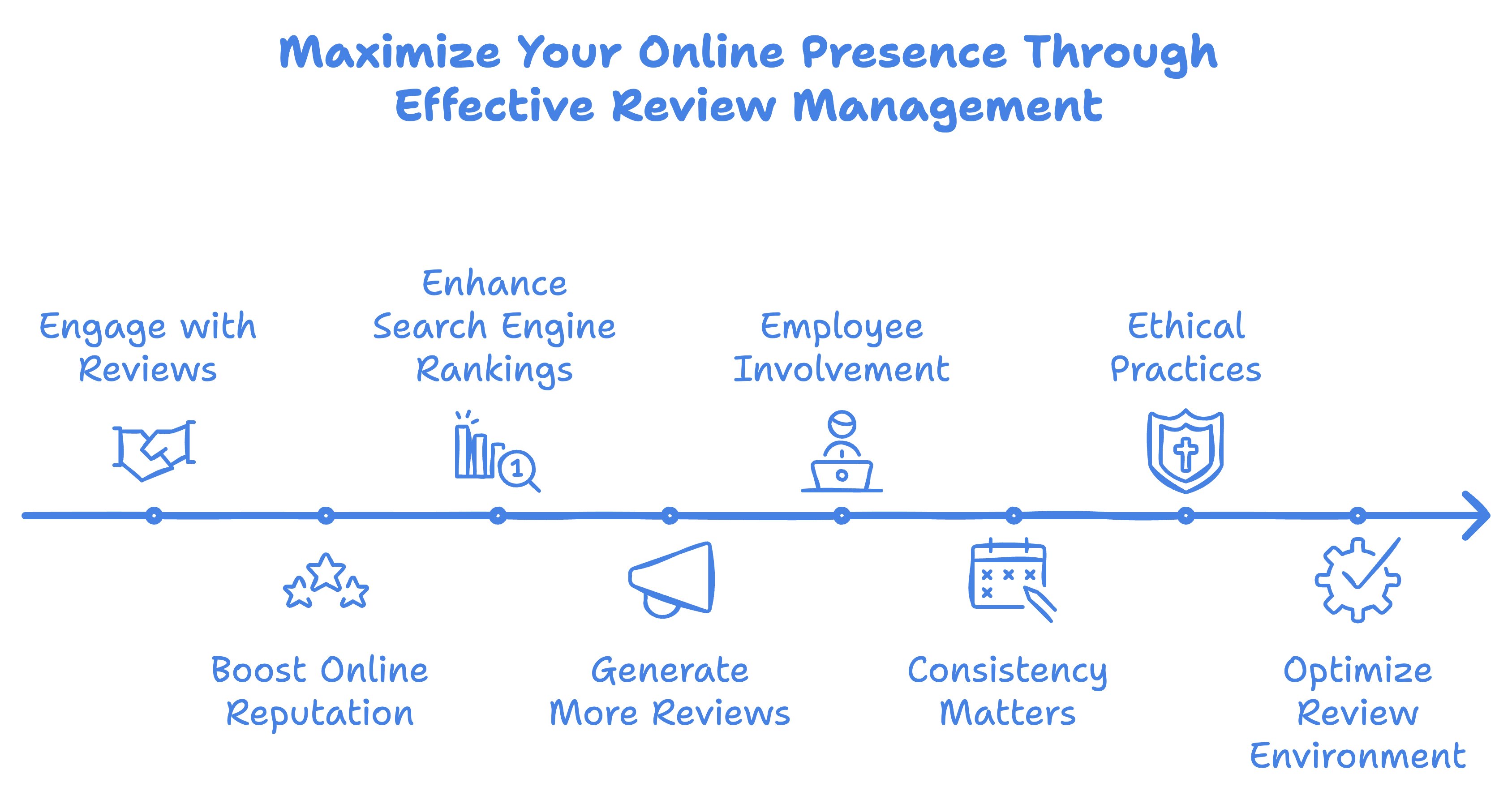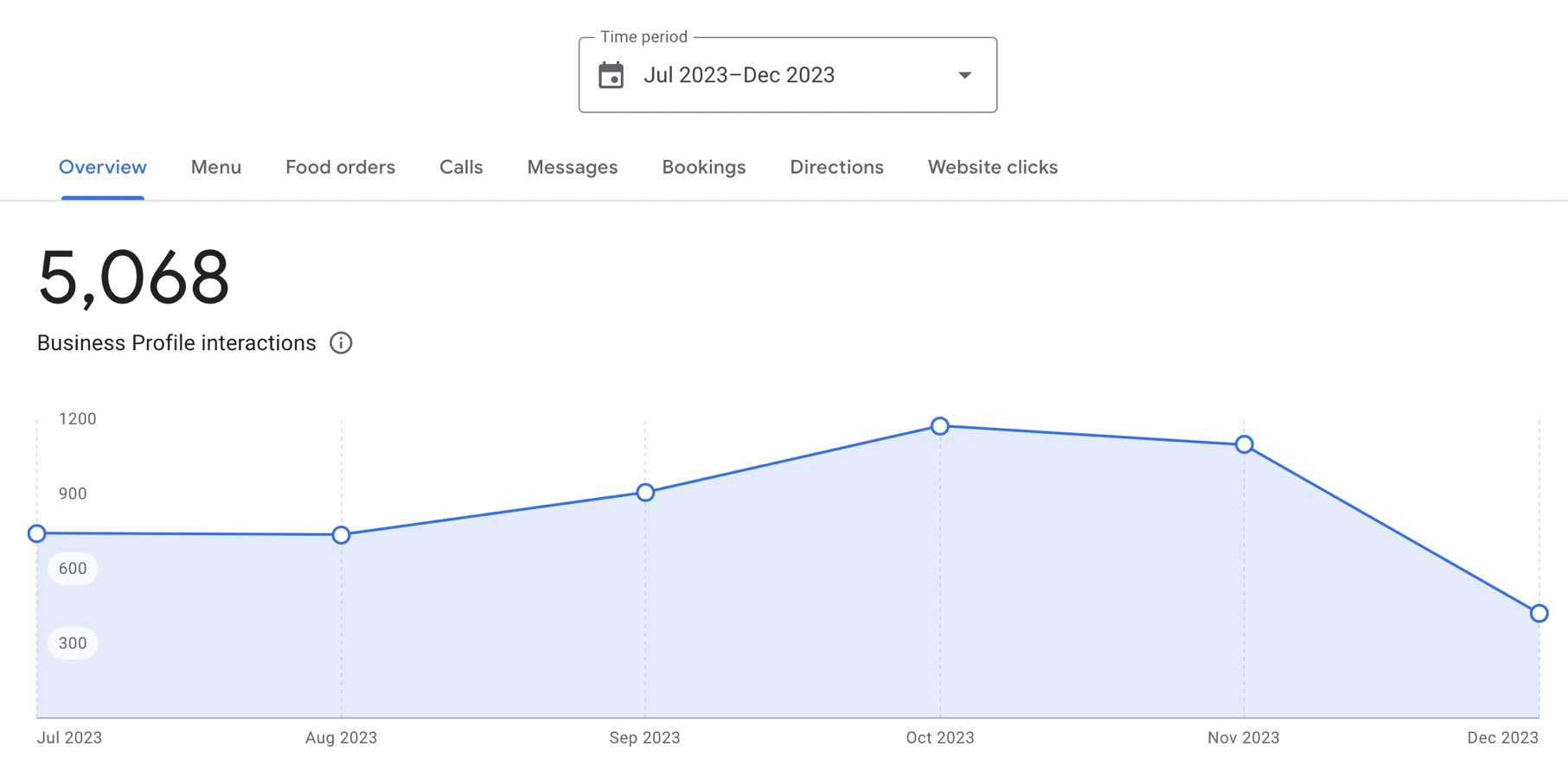Maximizing Your Online Presence with the Power of Google Reviews
Enhancing Customer Engagement and Loyalty: Leveraging Google Reviews for Sustained Business Growth and New Lifelong Clients
Key Takeaways
- Introduction to Google Reviews: Crucial for enhancing online visibility and credibility.
- Impact on Search Engine Rankings: Positive reviews improve search rankings significantly.
- Building Customer Trust: Authentic reviews influence customer decisions and build trust.
- Effective Review Management: Essential for reputation enhancement and customer engagement.
- Engaging Employees in Review Process: Employee involvement is key in generating and responding to reviews.
- Consistency in Managing Online Reviews: A consistent approach is vital for maintaining a strong online presence.

Boosting Your Business Through Effective Review Management
In the era of digital business, online reputation is paramount, and Google Reviews have emerged as a significant player in this landscape. These reviews, posted by customers, have the potential to greatly influence a business’s image, visibility, and success.
In this article, we will explore the world of Google Reviews, shedding light on their importance, the benefits of effective management, and practical strategies for businesses to leverage their power. Whether you’re a small local shop or a global corporation, understanding and optimizing Google Reviews can be a game-changer for your online presence and customer engagement.

The Review Landscape
Google Reviews have become a cornerstone of the modern business environment. They serve as digital word-of-mouth, where customers can share their experiences with your business for the world to see. However, it’s not uncommon for these reviews to go unanswered, potentially leaving a valuable resource untapped.
Consider a scenario where a business, like yours, has accumulated a range of reviews on their Google listing. Some of these reviews may be positive, praising your products or services, while others could be critical, highlighting areas for improvement. The common thread among these reviews is that they represent the voice of your customers, and their opinions matter.
It’s not just the content of the reviews that holds significance; it’s also how you respond to them. Responding to reviews is an opportunity to engage with your customers directly, acknowledge their feedback, and show them that their opinions are valued. When customers see that a business is actively participating in these conversations, it can foster a sense of connection and trust.
However, we understand that not all reviews require a response. Sometimes, negative reviews from the past may no longer be relevant, and it’s wise to let them stand without further engagement. In this article, we will explore the nuances of when and how to respond to Google Reviews, the potential benefits of doing so, and how it can positively impact your business’s online reputation.

The Benefits of Responding to Reviews
Engaging with Google Reviews extends far beyond mere online courtesy—it offers numerous tangible benefits that can enhance your business in multiple ways. Here’s a closer look at why responding to reviews matters:
- Customer Engagement and Loyalty: When customers take the time to leave a review, they are actively engaging with your business. By responding promptly and thoughtfully, you demonstrate your commitment to customer satisfaction. This interaction can foster a sense of loyalty and trust, potentially turning one-time customers into loyal advocates for your brand.
- Enhanced Online Reputation: Your online reputation is a crucial factor in attracting new customers. When potential clients search for businesses like yours, they often read reviews to gauge the quality of your products or services. Timely and positive responses to reviews can create a favorable impression, instilling confidence in potential customers and encouraging them to choose your business over competitors.
- Improved Customer Experience: Responding to reviews isn’t just about appeasing unhappy customers; it’s also about thanking and acknowledging those who have had a positive experience. By doing so, you reinforce the notion that customer satisfaction is a top priority. Additionally, by addressing concerns raised in negative reviews, you have the opportunity to learn from feedback and make necessary improvements to your business.
- Boost in Search Engine Rankings: While Google keeps its search algorithms a closely guarded secret, there’s evidence to suggest that actively managing your Google Reviews can positively influence your search engine rankings. Google values businesses that engage with their customers, and this activity can contribute to improved visibility in search results.
- Competitive Edge: In a competitive market, every advantage counts. Many businesses neglect to respond to their reviews, leaving a void that you can fill. Being responsive sets you apart from competitors and positions your business as one that cares about its customers’ opinions and concerns.
- Top-of-Mind Awareness: An often-overlooked benefit of responding to reviews is that Google sends your response directly to the customer. This creates top-of-mind awareness, reminding your best customers about your business and encouraging them to return. It’s a subtle yet powerful way to keep your brand fresh in the minds of those who matter most.
- Humanizing Your Brand: Reviews are a space where your business can showcase its human side. Personalized responses show that there are real people behind your brand who care about their customers. This human touch can create a deeper emotional connection with your audience.
The Impact on Google Ranking
Your business’s online presence and visibility in search engine results are influenced by numerous factors, and Google Reviews play a more significant role than you might realize. When managed effectively, these reviews can contribute to improved search engine rankings, which, in turn, can bring more potential customers to your virtual doorstep.
Here’s how Google Reviews can positively impact your business’s ranking:
- User Engagement Signals: Google pays close attention to how users interact with your business listing. The more engagement your listing receives, such as clicks, phone calls, website visits, and reviews, the more favorable it appears to Google’s algorithms. By actively responding to reviews, you demonstrate your commitment to customer satisfaction, signaling to Google that your business is relevant and deserving of higher visibility.
- Fresh and Relevant Content: Each time you respond to a review, you add fresh, relevant content to your Google listing. Google values up-to-date information, and this continuous activity can keep your listing current. Frequent interactions indicate that your business is active and in touch with its customers, further bolstering your online presence.
- Keywords and Phrases: User-generated content, including reviews, often contains valuable keywords and phrases related to your business. When customers leave reviews, they use terms that potential customers might search for. Google recognizes these keywords and may rank your business higher in search results for relevant queries.
- Social Proof and Credibility: Positive reviews provide social proof of your business’s quality, reliability, and customer satisfaction. Google considers this as a trust factor when determining rankings. A higher number of positive reviews can enhance your credibility in the eyes of both Google and potential customers, potentially resulting in improved rankings.
- Competitive Advantage: Many businesses neglect to actively manage their Google Reviews, missing out on the opportunity to influence their rankings positively. By being proactive in responding to reviews, you gain a competitive edge, positioning your business as one that cares about its customers and is willing to go the extra mile to engage with them.
- Keyword Insights: Google Reviews can provide valuable keyword insights. Customers often use specific words and phrases in their reviews that may not have been part of your optimized keywords. This feedback can uncover new keyword opportunities, allowing you to refine your content and reach new customers who are searching for those terms.
By consistently managing your Google Reviews and actively engaging with your customers, you not only contribute to an overall strategy that enhances your online visibility but also gain valuable insights that can inform your content and marketing efforts. In the following sections, we will delve into practical strategies for optimizing your Google Reviews and harnessing these benefits to their full potential.
Pro Tip: Enhance Your Site with Google’s API to Showcase 5-Star Reviews
Utilize Google’s API to dynamically integrate your 5-star reviews directly onto your website. This Pro-tip strategy not only refreshes your site with updated content but also highlights your top customer experiences prominently. By adding these 5-star reviews, you infuse your website with relevant keywords, enhancing SEO. It signals to Google and visitors alike that your site is active and current, demonstrating user engagement. Placing these glowing testimonials near calls to action will also improve conversion rates. Overall, this approach enriches the user experience, allowing potential customers to see your business at its best.
Implementing a Review Generation Strategy
Now that we’ve explored the impact of Google Reviews on your business’s online presence and visibility, it’s time to dive into the practical steps for optimizing your reviews and actively engaging with your customers. One of the key objectives is not just to respond to existing reviews but also to encourage more customers to leave reviews, thereby strengthening your online reputation.
Here’s how you can implement a review generation strategy:
- Add Review Prompts to Your Website: Make it easy for your customers to leave reviews by adding review prompts on your website. Consider placing a prominent “Leave a Review” button on your homepage, contact page, or within your post-purchase confirmation emails. The goal is to reduce friction and guide customers to the review platform.
- Educate Your Staff: Encourage your staff to be proactive in requesting reviews from satisfied customers. Train them to ask for reviews politely and provide guidance on how customers can leave feedback. Consider implementing a rewards system or recognition program for employees who excel in generating reviews.
- Timing Matters: Timing is crucial when soliciting reviews. After a positive customer interaction, seize the opportunity to request a review. For example, if you run a restaurant, ask for a review when the customer expresses satisfaction with their meal. If you operate an e-commerce store, send a follow-up email shortly after a successful purchase.
- Provide Clear Instructions: Customers may be willing to leave a review but unsure of the process. Provide clear, step-by-step instructions on how to write a review on platforms like Google. Include links to your Google listing and highlight the simplicity of the process.
- Leverage In-Person Interactions: If your business operates in a physical location, such as a retail store or medical office, consider using signage or informational cards near checkout areas to encourage customers to leave reviews. Be sure to mention the benefits of their feedback, such as helping others discover your business.
- Engage with Existing Reviews: Actively engaging with existing reviews can also spur more customer participation. When customers see that their reviews are acknowledged and appreciated, they may be more inclined to leave additional feedback or share their experiences with friends and family.
- Utilize Social Media: Leverage your social media platforms to request reviews from your followers. Share links to your Google listing and ask for their support. You can also use social media to share positive reviews, showcasing your commitment to customer satisfaction.
Remember that while it’s important to encourage reviews, it’s equally crucial to maintain authenticity. Genuine, honest feedback from customers is the most valuable. Avoid incentivizing customers for 5-star ratings or engaging in deceptive practices, as this can harm your reputation in the long run.
By implementing a well-rounded review generation strategy, you can not only increase the quantity of reviews but also ensure they reflect the genuine experiences of your customers. In the next sections, we’ll delve into how to respond to reviews effectively and maintain consistency in your review management efforts.

Employee Engagement
Harnessing the power of Google Reviews doesn’t have to be a one-person effort; your entire team can contribute to your success in this area. Encouraging your employees to be proactive in review management can lead to more reviews, improved customer engagement, and a stronger online presence. Here’s how to get your staff involved:
- Training and Education: Start by educating your staff on the importance of Google Reviews and their role in the process. Explain how reviews can impact the business’s reputation, visibility, and overall success. Provide clear guidelines on how to request reviews politely and professionally.
- Lead by Example: Demonstrate the importance of responding to reviews by actively engaging with them yourself. Share success stories and positive interactions resulting from review responses. Your enthusiasm for this process can motivate your staff to follow suit.
- Recognition and Rewards: Consider implementing a recognition or rewards program to incentivize your employees to actively request reviews. Offer small incentives, such as gift cards or public recognition, to those who excel in generating reviews. Creating healthy competition among your staff can be an effective motivator.
- Review Solicitation Scripts: Provide your employees with review solicitation scripts that they can use in their interactions with customers. These scripts should be polite, non-intrusive, and emphasize the value of customer feedback. Encourage staff to personalize their requests to make them more genuine.
- Regular Check-Ins: Incorporate regular check-ins with your staff to discuss their review generation efforts. Share feedback from customers who have mentioned specific employees positively in their reviews. Recognizing and celebrating these mentions can boost morale and motivate staff to continue their efforts.
- Training on Review Platforms: Ensure that your employees are comfortable navigating review platforms like Google. Provide training on how to guide customers through the review-writing process, including how to access your Google listing and leave feedback.
- Consistency in Requests: Encourage staff to make requesting reviews a consistent part of their customer interactions. Whether it’s during a sale, a service appointment, or a follow-up communication, consistency in asking for reviews can lead to a steady stream of feedback.
- Feedback Loop: Create a feedback loop where staff can share insights and challenges related to review generation. This allows you to refine your approach, address any concerns, and continuously improve your strategies.
Remember that your employees are a valuable asset in your efforts to generate reviews. Their engagement not only contributes to the growth of your online presence but also reinforces a customer-centric culture within your organization. By making review management a team effort, you can create a more holistic and effective strategy for building your online reputation. In the following sections, we will explore the importance of consistency in your review management efforts and address ethical considerations in the process.
Pro Tip: Celebrate Employees Featured in Reviews
Incentivize your team by rewarding employees who are frequently mentioned in customer reviews. Select standout reviews that praise an employee, and create a visually appealing image featuring these accolades. Take a photo of the employee with this image, then share it on your social media accounts, highlighting the positive feedback. For example, you could post: “Here’s what customers are saying about Jan!” This not only motivates your staff but also showcases your commitment to excellent customer service on your social platforms.
Consistency is Key
In the world of Google Reviews, consistency is more than just a good practice; it’s a fundamental principle that can make a significant difference in how your business is perceived and ranked. Here’s why maintaining consistency in your review management efforts is essential:
- Natural Online Profile: A consistent stream of reviews, both in terms of quantity and frequency, creates a more natural online profile for your business. This suggests ongoing engagement with customers and a continuous commitment to excellence.
- Positive First Impressions: When potential customers visit your Google listing, they are more likely to trust a business that has a consistent history of reviews. It provides reassurance that your business is reputable and dependable.
- Customer Confidence: Consistency in responding to reviews shows that you value all customer feedback and are dedicated to providing exceptional service. This boosts customer confidence and encourages more individuals to engage with your business.
- Search Engine Rankings: Search engines like Google reward businesses that maintain active and consistent engagement with their customers. A steady influx of reviews and responses can positively influence your search engine rankings, making your business more visible to potential customers.
- Mitigating Negative Impact: In the event of a negative review, a history of consistent positive interactions can offset the impact of one or two critical comments. A strong foundation of positive reviews demonstrates that your business consistently delivers quality service.
To maintain consistency in your review management:
- Set clear expectations for your team regarding response times and the frequency of review requests.
- Monitor your Google Reviews regularly to ensure no review goes unaddressed.
- Encourage a culture of continuous improvement within your organization, where feedback from reviews is used constructively to enhance the customer experience.
- Keep your review generation efforts ongoing, rather than sporadic, to ensure a steady flow of feedback.
Remember that consistency is not just about quantity; it’s also about the quality of your responses. Responding to reviews with sincerity, empathy, and professionalism reinforces the message that you genuinely care about your customers’ experiences.
In the final sections of this article, we will address ethical considerations in review management and offer guidance on how to navigate this aspect with integrity and authenticity.
Avoiding Incentivization and Ethical Review Practices
While actively encouraging customers to leave reviews is a crucial part of managing your online reputation, it’s essential to approach this task with integrity and adherence to ethical standards. Here are some important considerations to keep in mind:
- Genuine Reviews Over High Ratings: It’s tempting to incentivize customers for 5-star reviews, but this approach can be unethical and potentially harmful in the long run. It’s far more valuable to receive genuine, honest feedback, even if it includes areas where your business can improve. Encourage customers to share their true experiences.
- Transparency is Key: If you choose to offer incentives for reviews or engage in any form of compensation for feedback, be transparent about it. Clearly state that you’re seeking honest reviews and that any incentives provided are not contingent on a positive rating.
- No Fake Reviews: Never create or solicit fake reviews. Google and other review platforms have stringent policies against fake reviews, and they can result in severe penalties, including the removal of your business listing. Authenticity is paramount.
- Response to Negative Feedback: Negative reviews are an opportunity for improvement. When responding to criticism, avoid being defensive or dismissive. Instead, acknowledge the customer’s concerns, express your commitment to addressing the issue, and offer solutions or explanations where appropriate.
- Encourage Honesty Among Employees: If you incentivize employees to request reviews, make it clear that their role is to ask for honest feedback, not 5-star ratings. Encourage them to emphasize the value of customers’ genuine experiences.
- Review Platform Guidelines: Familiarize yourself with the guidelines and policies of review platforms like Google. These platforms have rules in place to maintain the integrity of their reviews. Violating these guidelines can result in the removal of reviews or even the suspension of your account.
- Positive Reinforcement: Instead of offering incentives for reviews, consider rewarding employees for consistently providing excellent customer service. When staff members excel at creating positive experiences, it naturally leads to more positive reviews.
- Lead by Example: As a business owner or manager, set the tone by actively engaging with reviews in an ethical and genuine manner. Your example can influence how your team approaches review management.
By adhering to these ethical practices, you can build a reputation for your business that is based on honesty and authenticity. This not only ensures compliance with review platform guidelines but also fosters trust among your customers and potential clients.
In the concluding section of this article, we will emphasize the importance of the review environment and provide insights on how it can further enhance the effectiveness of your review management strategy.
PRO TIP: Implement a Feedback-Based Review System
Create an approach where you inquire first about customer satisfaction. If a customer indicates dissatisfaction, direct them to a feedback form where they can voice concerns, ensuring they receive attention from management or customer service. However, if the response is positive, guide them with links to leave a review on your Google Business Profile or other review platforms. This strategic method helps address issues proactively while promoting positive public feedback.

Review Environment
Creating the right environment for reviews can significantly impact the authenticity and effectiveness of your review management strategy. Here are some insights into how the review environment can enhance your efforts:
- Encourage Reviews Outside of Your Wi-Fi Network: While it’s perfectly acceptable for customers to leave reviews while connected to your Wi-Fi, it can appear more natural if reviews are generated from different network connections. Encourage customers to leave reviews when they are on their own LTE or mobile data connections. This diversity in review sources can add credibility to your online presence.
- Ensure a User-Friendly Review Process: Make it as simple as possible for customers to write reviews. Provide clear instructions, clickable links, or QR codes that take them directly to the review platform. A seamless process reduces friction and increases the likelihood of customers leaving feedback.
- Personalize the Experience: When requesting reviews, personalize your approach. Mention specific aspects of the customer’s interaction with your business, such as the product they purchased or the service they received. This personal touch shows that you value their individual experiences.
- Mobile Accessibility: Recognize that many customers access review platforms via mobile devices. Ensure that your review request and response process is mobile-friendly, with easy navigation and legible text.
- Prompt Customer Feedback: After a transaction or service, promptly request reviews from satisfied customers. Fresh experiences are more likely to lead to accurate and enthusiastic feedback.
- Regularly Monitor Review Platforms: Keep a watchful eye on your business’s reviews across various platforms. Respond promptly to new reviews, whether positive or negative, to maintain an active and engaged online presence.
- Collect Insights: Use reviews as a source of insights into customer sentiment and areas for improvement. Analyze recurring themes or issues mentioned in reviews to make informed decisions that can enhance your business operations.
By creating a conducive environment for reviews, you can increase the likelihood of customers sharing their experiences, improve the authenticity of the feedback received, and contribute to a more positive online reputation. The goal is to make the review process seamless and user-friendly, encouraging customers to participate willingly.
In the final section of this article, we’ll summarize the key takeaways and emphasize the proven strategies that can help you create new business opportunities and cultivate a network of loyal customers through effective review management
Pro Tip: Create an Easy-to-Remember Link for Reviews
Design a simple, memorable link like “YourDomain.com/review” to gather customer feedback. This link should first take customers to a simple survey form on your website. If they’re happy with your service, they can then be directed to the Google form (or other network) where they can leave a review. This approach makes it easier for customers to share their positive experiences.

Leveraging Reviews for Business Growth
In today’s digital landscape, the power of Google Reviews cannot be overstated. They serve as a window into your business, offering insights into customer experiences and shaping your online reputation. By actively managing and engaging with these reviews, you can unlock a wealth of benefits for your business. Here’s a recap of the key strategies and takeaways:
- Engage Actively with Reviews: Respond to both positive and negative reviews promptly and professionally. Acknowledge feedback, express gratitude, and demonstrate a commitment to customer satisfaction.
- Boost Your Online Reputation: Google Reviews contribute significantly to your online reputation. Positive interactions with customers can enhance your credibility and trustworthiness, attracting new customers to your business.
- Enhance Search Engine Rankings: Consistent review management can positively influence your search engine rankings. Google values businesses that engage with customers, leading to increased visibility in search results.
- Generate More Reviews: Implement a review generation strategy that encourages customers to leave feedback. Use your website, social media, and in-person interactions to guide customers to review platforms.
- Employee Involvement: Encourage your staff to participate in review management. Train them to request reviews professionally and recognize their contributions through recognition or rewards programs.
- Consistency Matters: Maintain a consistent stream of reviews to create a natural online profile for your business. Regularly monitor and respond to reviews to demonstrate your ongoing commitment to excellence.
- Ethical Practices: Prioritize honesty and authenticity in your review management efforts. Avoid incentivizing for 5-star ratings and never engage in fake reviews. Transparency is key.
- Optimize the Review Environment: Encourage reviews from different network connections, provide clear instructions, personalize your approach, and ensure mobile accessibility to make the review process as user-friendly as possible.
By implementing these strategies and adhering to ethical practices, you can harness the full potential of Google Reviews to create new business opportunities, foster a network of loyal customers, and establish your business as a trusted and reputable entity in your industry.
Remember that the power of reviews extends beyond the online world; it influences real-world decisions. Cultivate a culture of customer-centricity within your organization, where feedback is not just collected but actively used to drive improvement and growth.
If you have any questions or require further guidance on managing your Google Reviews effectively, feel free to reach out. Your proactive approach to review management will undoubtedly contribute to your business’s long-term success.
Take Action Today
Harnessing the potential of Google Reviews is a strategic move that can propel your business to new heights. It’s not just about managing reviews; it’s about actively engaging with your customers, building trust, and leveraging the power of feedback to drive growth.
If you’re ready to take your online reputation and customer engagement to the next level, consider scheduling a marketing consultation with Tony Darrick Baker, a seasoned expert in digital marketing strategies. Tony can provide you with personalized insights and strategies tailored to your business’s unique needs.
To schedule your consultation and embark on a journey to strengthen your online presence, attract new customers, and cultivate a loyal network of satisfied clients, visit https://xeal.net/contact/ today.
Don’t miss out on the opportunity to unlock the full potential of Google Reviews for your business. Take action, and let Tony guide you toward a future filled with growth and success.
Create a Network of Lifelong Customers with Google Reviews
- Respond to Reviews Promptly: Engage with all reviews to show customer value.
- Encourage Review Generation: Simplify the review process for customers.
- Maintain Ethical Practices: Focus on genuine, honest feedback.
- Utilize Employee Engagement: Involve staff in the review process.
- Consistency in Review Management: Regularly monitor and manage online reviews.
- Leverage Reviews for SEO: Use reviews to improve search rankings.
- Personalize Customer Interactions: Tailor review requests to each customer.
- Utilize Insights from Reviews: Analyze feedback for business improvement.
- Build a Community Around Your Brand: Foster a sense of belonging among customers.
- Implement a Customer Loyalty Program: Reward repeat customers to encourage loyalty.


